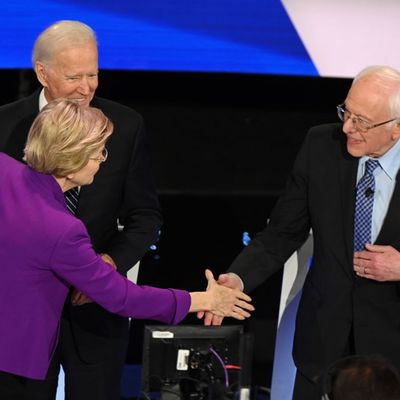
It took around 45 minutes, but moderators at Tuesday night’s debate finally addressed the elephant in the room: How would Bernie Sanders and Elizabeth Warren respond to the report that Sanders told Warren he did not think a female candidate could win in 2020? CNN moderator Abby Phillip began the exchange with a question that left no room for interpretation, despite the Vermont senator’s denial of the private exchange: “Why did you say that?”
After his direct denial, Sanders dismissed the importance of the allegation of sexism, claiming that serious focus on the matter is “what Donald Trump, maybe some of the media, want.” He said it was “incomprehensible that I would think a woman could not be president of the United States,” citing his record of supporting the idea of a putting a woman in the Oval Office; Sanders also noted Hillary Clinton’s popular-vote win in 2016 as evidence of the irrelevance of the sexist myth.
After Sanders again denied the contents of the conversation, Phillip essentially ignored his answer, asking Warren what she thought “when Senator Sanders told you a woman could not win the election.” In her response, the Massachusetts senator again countered his account, saying that she “disagreed” with Bernie’s statement.
From there, Warren smoothly deescalated the conflict, while making the case for her electability. “Bernie is my friend,” she said, “and I’m not here to try and fight with Bernie.” She then attacked the underlying concern of electoral sexism “head on,” noting that the men on the stage had lost ten elections. “The only people onstage who’ve won every single election they’ve been in are the women, Amy [Klobuchar] and me,” Warren said. “The only person on this stage who’s beaten an incumbent Republican any time in the past 30 years is me,” referring to her win over Scott Brown in 2012.
Senator Klobuchar then added that all types of candidates can win, they just have to “be competent.” But while listing examples of competent female candidates, she forgot the name of Kansas Governor Laura Kelly:
The exchange then return to Sanders, who wanted to let the audience know that he, too, defeated a Republican incumbent in Congress in 1990, leading to an all-together unnecessary back-and-forth over the definition of how long ago 30 years was:
And though the conversation onstage remained cordial, after the closing comments, the body language of the two senators appeared far more contentious than their words during the debate. (Tom Steyer will be able to prove the the case for his candidacy if, and only if, he reveals the contents of the exchange between the pair of progressives.)






























